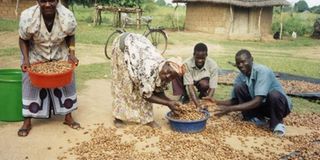Research, market boost oilseeds in eastern Uganda

Farmers sort groundnuts after a harvest. With support from research via improved varieties and better seed and a ready market , the production of oilseeds has been boosted in northern and eastern Uganda, which are the biggest producing regions. FILE PHOTO
The eastern region, which has relied on traditional cash crops like coffee and cotton, is slowly adapting to oilseeds.
Besides those in the fields such as sunflower, there are 10 other crops under research at the regional research institute based in Serere District, which can be categorised as oil seeds.
Many farmers agree that soya bean, groundnuts, sesame (simsim) and sunflower are becoming an economic lifeline for the region and Uganda as a whole.
Against this backdrop, a meeting was organised by Uganda Oilseed Sub-sector Platform (OSSUP) focused on the theme “Exploring the Opportunities in Inclusive Partnerships in the Oilseed Sub-sector with Focus on Seed Business.”
It was in partnership with National Agricultural Research Organisation (Naro), CARD Uganda and SNV, a Dutch agency.
At the meeting, it was revealed that despite the potential of production, there is a challenge of demand for seed.
“This area had unmet seed demand of 30-40 per cent in soybean, groundnuts and sesame, while that of sunflower was as high as 90 percent, this meant that despite the high productive potentials, the region could only meet 60 per cent of the available market,” said Mr Biruma, a researcher from Naro.
This was echoed by agribusiness manager at CARD Uganda, Samson Musimbi, who said during project inception, it was evident that one of the key challenges was access to good quality seed for farmers who wanted to engage in oilseed production.
“However, many of these challenges have been overcome through OSSUP, which brings stakeholders together to discuss and find viable solutions,” he added.
It was believed that oilseeds would work as an alternative cash crops to coffee, cotton and maize and help improve household incomes.
Therefore the Platform, with funding from SNV and International Fund for Agricultural Development (Ifad), formed regional hubs in Lira, Gulu, West Nile and Mbale with Makerere University as the research centre.
As a result, farmers have been able to access seed and demonstrations on Farmer Learning Platforms, which were set up to test different varieties of seeds on small plots of about a quarter an acre, as well as benefit from the experiences shared.
Bonny Obua, a research fellow from Makerere University’s College of Agriculture and Extension Services, notes that this has paid off so far.
“As research partners, we have been involved in developing foundation seeds that are favourable for target areas and the seeds could then be used by profit-making seed companies and NGOs for multiplication and dissemination to farmers,” he said.
Helen Acam, a member of OSSUP is one of the farmers who have benefited from the linkage to research for access to seed and capacity building.
“We used to plant our local seeds and the yields were not satisfactory. But the introduction of improved seeds has helped us boost production and quality,” she said.
The action research contributes to cross-site learning, understand diversity at district level and filtering the strategic levers at various levels.
“The action research primarily supports the strategising process of OSSUP, and, indirectly, change in the chain, in public-private partnership and in different localities,” said Isaac Abwa, the programme manager, CARD Uganda.
At national level, it is estimated that oilseeds account for more than 60 per cent of the national vegetable oil production, and directly affect the livelihoods of over 12 million Ugandans. Today, there are more than 200,000 farmers whose livelihoods have been impacted through the Platform.




